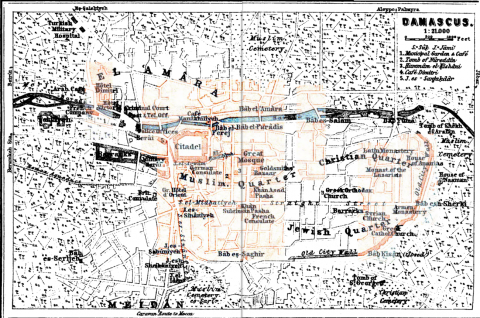Sam and companions arrived in Damascus at sunset on September 14, 1867. They departed at noon on September 16, traveling to Kefr Hauwar. Mark Twain Project: Quaker City Itinerary
The most fanatical Mohammedan purgatory out of Arabia
Ian Strathcarron in Innocence and War reports having determined which hotel the pilgrims stayed at. He assumes they must have stayed in the Christian quarter wherein he narrows it down to one that is at least identical to Twain's description, the Hotel Dar Al-Yasmin. Both he and Twain, many year previous, settle down with narghiles.
Twain reports becoming very ill with cholera or cholera morbus, Ian Strathcarron in Innocence and War is dubious, thinking that perhaps Twain is merely trying to escape from accompanying his fellow pilgrims to a Presbyterian church that had opened just a year before. I suspect, however, that he may have been hit with a dysentery type disease given all the well water he'd be drinking the day before. I've been hit with that twice now myself and both times it was 24 hours of extreme discomfort. The handling of drinking water Twain describes is less than sanitary including swimming poodles.
Strathcarron does go on the provide a rather detailed description of events and political postures leading up to the Christian massacres that occurred there just five years previous.
I may or may not be able to map all the points of interest in Damascus that Sam visited, but here is a brief list courtesy of Ian Strathcarron. 'Street which is called Straight', "Houses of Judas and Ananias', 'where St. Paul recovered', 'where St. Paul escaped', 'tomb Mahommed's children', 'tomb St. George (dragon)', 'where St Paul hid under rock', 'mausoleum for 5k Christians killed 1861', 'Naaman's leper house'.
From Bædeker: (1898)
Damascus (33° 30' N. lat. ; 34° E. long.), the largest city in Syria, affords the best opportunity for observing the characteristics of the natives. There are few antiquities or buildings worthy of mention. The chief attractions are the variety of costumes, the brisk and motley traffic in the streets, and the environs. Most travellers remain one or two days only at Damascus, as their contract with their dragoman, as usually drawn up, renders delay expensive; but to enjoy a visit to the city, a longer stay is necessary, and for these days of rest they should stipulate for a much lower rate of payment to the dragoman.
See Bædeker 1876 pages 460-489 (Route 29) for Damascus:
See Murray Route 33 section on Damascus pages 468-494
- Innocents Abroad
- A History of Damascus
- Bædeker Walks Through the Bazaars
- Bædeker Walks through the Meidân and round the City Walls (Christian Quarter).
- Bædeker: From Damascus to Ez-Zebedâni (1898)
- Damascus
- Population of Damascus: per Bædeker
- Self-Righteous Pilgrims
- September 14 Saturday: Sirghaya, Figia and Damascus.
- September 15 Sunday Twain reports being very sick for the last 24 hours he spent in Damascus
- September 16 Monday: Sam and group left Damascus at noon, and camped that night at Jonesborough.
- Topography of Damascus: per Bædeker
- Innocents in the Holy Land
